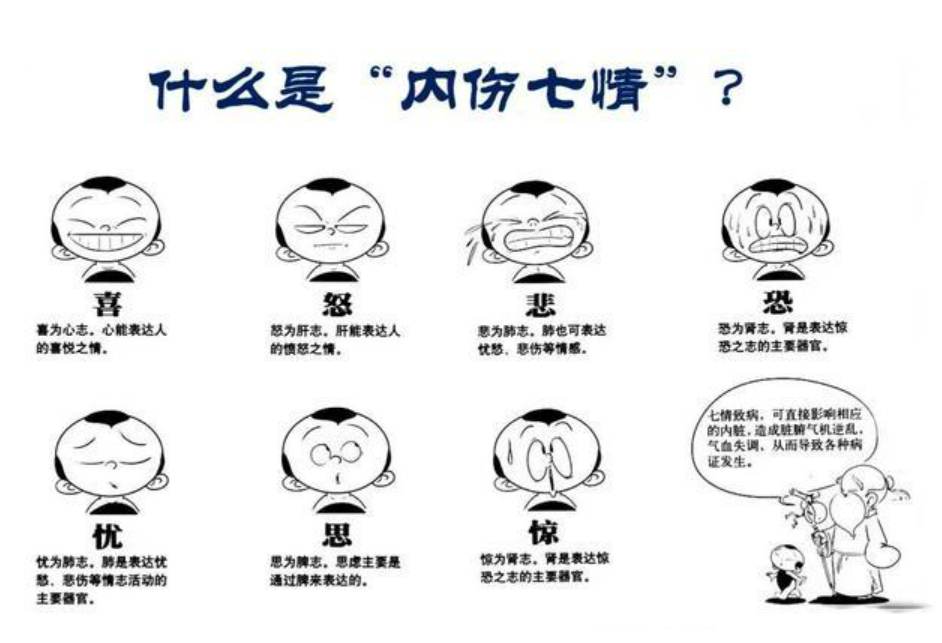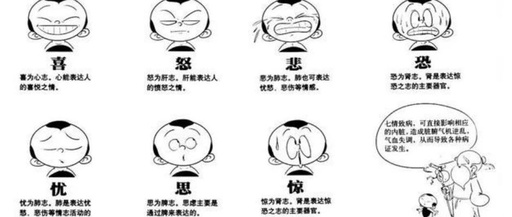In Traditional Chinese Medicine (TCM), we recognize the causes of internal injuries related to emotions, known as the Seven Emotions (Qi Qing). The commonly known emotions are joy, anger, sorrow, and happiness, but in TCM, we refer to them as the Seven Emotions. What are the Seven Emotions?

 Seven Emotions
Seven Emotions
The Seven Emotions refer to the seven types of emotional activities: joy, anger, worry, thought, sadness, fear, and shock. Normal emotional activities do not cause illness; however, when emotional stimuli are too sudden, intense, or prolonged, exceeding the body’s capacity for regulation, it can lead to disharmony of Qi and blood, and dysfunction of the organs, resulting in disease.
The Su Wen states: “I know that all diseases arise from Qi. Anger causes Qi to rise, joy causes Qi to relax, sadness causes Qi to dissipate, fear causes Qi to descend, cold causes Qi to contract, heat causes Qi to leak, shock causes Qi to become chaotic, overwork causes Qi to deplete, and excessive thinking causes Qi to stagnate.”
01Anger causes Qi to rise:
Qi rising refers to the upward movement of Qi. Anger is associated with the liver; when one encounters frustration or dissatisfaction, it can lead to temporary anger, which generally does not cause illness.However, excessive anger can affect the liver’s ability to regulate, leading to liver Qi rising or stagnating, resulting in illness.
Rising Qi refers to blood following Qi upwards. Clinical manifestations of liver Qi rising may include headaches, flushed face, vomiting blood, and in severe cases, fainting.Stagnating Qi refers to liver Qi affecting the spleen and stomach, leading to symptoms such as abdominal distension, diarrhea (with undigested food residues, bowel sounds, and abdominal pain), belching, acid regurgitation, and vomiting.
As stated in the Su Wen: “Anger causes Qi to reverse, leading to vomiting blood and diarrhea.”

02Joy causes Qi to relax:
Qi relaxation refers to the calming of heart Qi, which includesboth the alleviation of tension and the dispersion of heart Qi. Joy is associated with the heart; under normal circumstances, joy can calm mental tension and promote a peaceful mood.However, excessive joy can scatter heart Qi, leading to symptoms of lethargy, lack of concentration, and even confusion or mania.
03Sadness causes Qi to dissipate:
Qi dissipation refers to the consumption of lung Qi. Sadness is associated with the lungs. It is an emotional expression of sorrow and grief; excessive sadness can damage lung Qi, leading to symptoms such as chest tightness, shortness of breath, fatigue, and mental lethargy. Thus, the Su Wen states: “Sadness causes the heart to be anxious, the lungs to be obstructed, and the upper burner to be unresponsive, leading to heat accumulation, hence Qi dissipates.”
04Fear causes Qi to descend:
Qi descending refers to the sinking of essence Qi. Fear is associated with the kidneys. It is an emotional expression of timidity and fear; excessive fear can lead to instability of kidney Qi, causing Qi to sink, often resulting in incontinence or even fainting. The Ling Shu states: “Fear and anxiety without resolution can damage essence; when essence is damaged, it leads to bone pain and weakness, and essence descends.”

05Shock causes Qi to become chaotic:
Qi chaos refers to the disorder of heart Qi. The heart governs blood and houses the spirit; excessive shock can lead to disordered heart Qi and disharmony of Qi and blood, resulting in feelings of fear and anxiety, palpitations, and even mental confusion. Shock differs from fear; fear is known, while shock is unknown.
06Thinking causes Qi to stagnate:
Qi stagnation refers to the accumulation of spleen Qi. Thinking is associated with the spleen; while thinking is a normal mental activity, excessive thinking can lead to stagnation of spleen Qi, resulting in symptoms such as poor appetite, abdominal distension, and even muscle wasting due to spleen dysfunction. Thinking arises from the spleen and manifests in the heart; excessive thinking not only harms the spleen but can also damage heart blood, leading to symptoms such as palpitations, insomnia, forgetfulness, and vivid dreams, hence the saying “excessive thinking harms the heart and spleen.”

The Seven Emotions can not only cause various diseases but also significantly influence the development and outcome of diseases. Generally, positive emotional changes are beneficial for recovery, while severe emotional fluctuations can exacerbate conditions.
Clinically, many diseases can undergo rapid changes under intense emotional stimuli. For example, patients with hypertension may experience a sudden rise in Yang Qi due to anger, leading to fainting or hemiplegia; patients with heart disease may suffer from angina, myocardial infarction, or even sudden death due to sudden emotional upheaval. Conversely, if a patient maintains a positive and optimistic emotional state after illness, with appropriate emotional expression, it can promote “harmonious Qi and spirit, and smooth circulation of Qi and blood,” aiding in recovery and health restoration. Therefore, whether treating diseases or preventing illness, the role of emotional factors should be emphasized.

